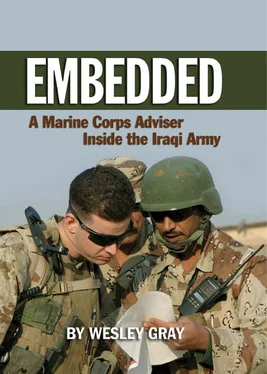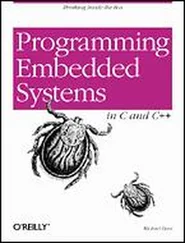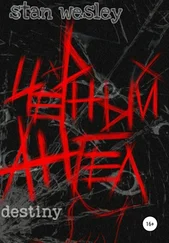The IEDs Come Back to Bite Us
Juwad came tearing through the MiTT camp in a Waz jeep. In broken English mixed with Arabic he frantically questioned, “Jamal, shaku maku [what happened] to all the people bil [in] Baghdad?” I was confused. Had the Green Zone been attacked? Had Al Qaeda attacked the capital again? I asked, “Juwad, I have not seen the news on Baghdad, what happened in Baghdad?” Perplexed, he responded, “No Baghdad—what happened in Baghdad?” Completely lost, I replied, “Juwad, treed ta’aroof an Baghdad loo Baghdadi?” (Juwad, do you want to know about Baghdad or Baghdadi?) He promptly responded, “Oh, yes, yes, yes—Baghdadi!”
I rushed into the MiTT COC and called 2/3’s command center to see if there was any current action in Baghdadi. Sadly, there was action, and it involved our team. The team had been hit with an IED on their way to Baghdadi, near where we had found the IEDs.
I couldn’t believe what I was hearing. Based on the location of the IED, it sounded like the same IEDs we’d found—the IEDs that EOD was supposed to have destroyed. If EOD caused someone in our Iraqi army or our MiTT to get jacked up, there was going to be some serious hell to pay. I rushed to call EOD to see if they had followed up on the IEDs from the day prior. The EOD clerk responded, “No. We did not have time.”
I was furious. I called up to the dam hoping to get more information from 2/3. The watch officer on duty proclaimed, “Lieutenant Gray, the latest information we have is that the convoy was hit by an IED thirty minutes ago.” “Great, that was really helpful,” I said. I hopped into the Waz with Juwad. “Yalla, nrooh lil harakat” (Let’s go to the Iraqi COC), I said. I knew that relying on the Marines for the latest information on the MiTT was not the smart choice. Getting information over the Iraqi radio net was the way to go.
Juwad and I ran into the S-6 and were greeted by a crowd of Iraqis who were all trying to get the scoop on the IED attack near Baghdadi. Abit, the Iraqi communications expert on duty, explained the latest to me. “Jamal, the convoy was heading north on Bronze toward Camp Ali when they hit an IED in the vicinity of the bridge we were examining the other day. Luckily it hit a Leyland, which by pure chance was filled with detainees the convoy was returning to the dam. No jundi or Marines were hurt, only detainees. I think one detainee is dead, and eight are injured. The convoy should be on Camp Ali any minute now.”
The convoy came crashing into Camp Ali moments after I left the Iraqi COC. Staff Sergeant Donaldson, hanging outside his Humvee’s window, yelled, “Get Doc!” I yelled back, “Why do you need Doc?” He quickly replied, “We have a Leyland full of bloody detainees!” I dashed for the MiTT camp to grab Doc.
Soon Doc and I arrived at the Leyland, the bed of which was full of crusted bodily fluids. Blood stained the detainees and the t-shirts that wrapped their injuries. As if the situation were not bad enough for the detainees, the jundi wanted to make it worse. They wanted to kill the detainees for causing the IED. They wanted to implement “Duke Nukem justice,” which involves blowing everyone up and “letting God sort ’em out.”
The logical progression of how the detainees caused the IED was not clear, yet one of the Iraqis on the convoy explained why it made sense to either kill or beat the detainees. First, these people were detained for a reason; they had not been picked up because they were on a Sunday stroll. It was likely the detainees were insurgents, and thus killing them now would probably eliminate a future problem. Second, the detainees were young males from the local areas and certainly knew what was going on in their streets. If the jundi were allowed to beat them, they could extract information on insurgent activity.
I replied, “If these detainees were insurgents, then why the heck would their insurgent buddies blow them up in an IED attack? You got a good answer to that one?” He didn’t have an answer. He simply responded, “I still think we should beat them.”
Iraqi logic is not always logical.
Chapter 16
Transitioning to Independent Operations
October 2006
As advisers we were not supposed to command the Iraqi army; rather, our mission was to advise Iraqis. At this point in the deployment, the MiTT controlled all Iraqi meetings, controlled all convoys, and conducted most of the planning for the Iraqi operations. The jundi did what we told them and gladly followed. In many ways the Iraqis were less prepared for independent operations than they had been with the previous MiTT. We had actually gone backward. This monumental failure annoyed me, and I decided to confront the problem myself.
Letting Iraqis Lead—A Novel Concept
My plan was to put together a convoy-training package that would transition the Iraqis to independent convoy operations, which made up 80 percent of our combat operations. The convoy setup involved three MiTT vehicles dispersed throughout the Iraqi convoy. We maintained the second, middle, and rear Humvee positions and kept control of the convoy at all times. The boss claimed that the Iraqis had free rein of the convoy, but that showed a complete lack of understanding. Every Iraqi officer who had conducted convoys had personally complained to me that the setup gave them no ability to control the convoy. Plus, with MiTT Humvees at the front, center, and rear of the convoy, it was difficult for the Iraqis to exercise any leadership without having their toes stomped on by our boss.
The three-phase plan I wanted to implement would radically change the way we did business as an adviser team. While the details of the plan were complicated, the basics of each phase were pragmatic and easy to grasp. The first phase would begin with a change in attitude. The Iraqis would not be looked upon as convoy participants but as convoy leaders. Additionally, the MiTT vehicle in the front of the convoy would be moved to the middle of the convoy and the other two MiTT vehicles would be in the rear of the convoy. By moving more toward the rear of the convoy, we would eliminate our ability to command and control the situation when things get hectic, which is the very time we want the Iraqis to work through the issues. Once everyone was comfortable with phase one we would move into phase two.
Phase two would take one of the MiTT vehicles completely out of the convoy. There was no reason to be risking four American lives and a bunch of equipment for absolutely no reason. In this phase, two American Humvees would sit in the rear of the convoy and merely provide communications support to call on American assets if the Iraqis needed them (calling up an EOD team to examine an IED would be an example). Also, the Iraqis would be required to give a full operations order before each convoy, which would cover all the aspects of the convoy mission.
Phase three of my plan was the gold standard. In this phase the MiTT would not even participate in convoy operations. We would merely coordinate movements and advise the Iraqis on COC operations back at battalion headquarters. The Iraqis would operate independently, make their own decisions, and learn from their own failures. There was no reason for Americans to die for Iraq when there were Iraqi soldiers to take on that risk. If we really wanted Marines to accomplish the mission in Iraq, we would kick out the Iraqi army, add an additional two hundred thousand troops, and implement martial law on the entire country. The tricky thing with the final phase was figuring out how to coordinate with other American units in the area and how to get support to the Iraqis if something bad happened.
Читать дальше












